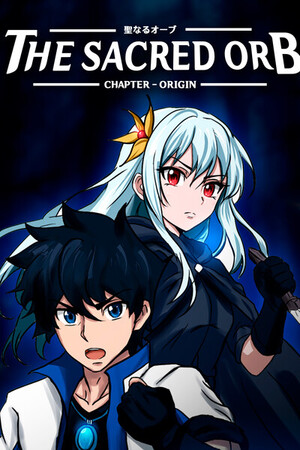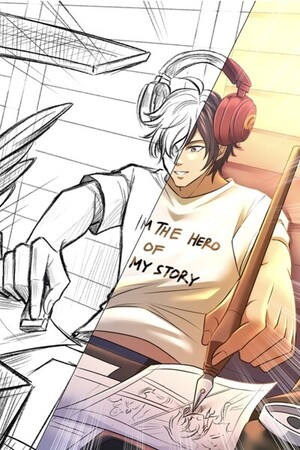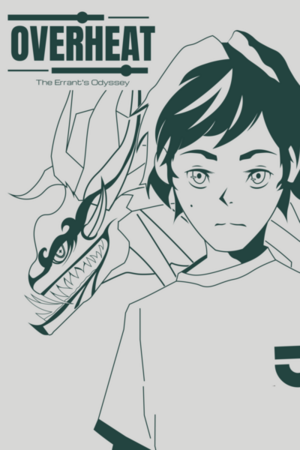Chapter 21:
Promises in Ash
The Sacred Orb
The alley seemed to swallow the world’s sound. Only three things remained: Lira’s small body in Asori’s arms, the motionless apple on the stones, and a silence that hurt.
Asori didn’t cry. He couldn’t. His face was blank, his chest locked, his fingers rigid around the girl as if letting go would erase her from his mind—clinging to the last of her—and above all, remembering when his parents died.
Blair arrived first. She stopped two steps away, honey bread crushed against her chest. The Sweet Kiss brought waves of emptiness and ice from Asori—tearless nausea and a pain so deep it had no end.
Mikrom came after, no jokes, no tavern grin. He took in the scene, the trail of blood, the apple. His hand drifted to the stone sword’s hilt by habit, but he didn’t draw. Not here, not yet.
Asori gulped air, and that was the first sound he made: a broken gulp that came out like an amputated sob.
—Not… not again… —he murmured, his voice splintering like a plank.
His throat burned. Suddenly his body stopped being stone and turned to live coal. Rage. A black tide rising through legs, belly, neck. He wanted to stand up in it.
—I’m going to kill them —he said to a random point on the wall—. All of them. Every last one.
The air vibrated. The Astral licked his skin like powder. Blair took half a step.
—Asori, look at me.
He didn’t hear. His fingers opened; he laid Lira gently on Asori’s cloak, and when his hands touched the ground, wind coiled around his wrists like it knew the way.
—Asori —Blair pressed, louder—. Look at me.
He rose in a jerk. The scream didn’t come—but the change did: white light expanding on an exhale; blue eyes lit; shirt turning paler, seams drawing tight; an aura lifting dust from the ground. Transformation.
The alley shrank around that glow.
—I’ll find them —he said, low—. I’ll rip the air from their lungs, they’ll pay for this—those heartless bastards will pay.
Blair’s stomach pitched. Not fear of him—fear of what he’d become if he crossed that line. A line she would not let him cross.
—Listen to me —she said, stepping closer—. Don’t lose yourself now.
Asori moved to pass her. Blair caught his forearm. The bond bit her with pain and rage and guilt. A torrent. A torrent that doesn’t understand words, an unstoppable force looking to unleash all its fury.
Mikrom moved without warning. One step, hip turn, the fist a hammer: crack! A clean right to the cheekbone. The aura’s light flickered.
Asori staggered, stunned, and looked at him like a wounded animal—eyes full of fury and pain.
—What…? —he managed.
Mikrom didn’t shout. He spoke clear, like passing sentence on a friend.
—You’re not the only one who suffers, kid. But if you go out to kill now, Lira dies twice: once on the ground and once inside you.
—I… I need to kill them to avenge her —Asori’s voice broke.
—Life is heavy —Mikrom went on—. Responsibility isn’t hauling what you did—it’s hauling what you didn’t do. And now you choose what kind of man you’ll be. The kind who turns pain into a knife just to hurt, or the kind who turns it into a promise.
Asori’s aura thrummed, disobedient. Rage still smashed inside. Blair tightened her grip.
—Breathe, Asori —she whispered—. Breathe with me.
He tried. Air came in jagged. The light shrank. The change loosened on a blink.
—No… —he shook his head—. I can’t…
Never looking away, Mikrom opened his arms a notch—choose.
—That girl’s life is not yours. Her memory is—don’t you dare stain it. Don’t foul her sacrifice.
Asori lowered his gaze. The light wavered again. And then, as if his body had waited for that crack—fatigue, anger, shock, the whole weight—came crashing down. The aura went out at once. Untransformed, he slumped sideways.
Blair caught him.
—I’ve got you, Asori —she said—. I’ve got you.
Asori passed out.
—Take care of your boyfriend —Mikrom said suddenly, meeting Blair’s eyes without a trace of joke—. I’ll be back. There are things I need to do.
Before Blair could answer, Mikrom was gone—slipping along the alley’s edge, silent, stone sword on his back, the hush of someone already decided.
Blair eased Asori into her lap, brushed the sweaty strand from his brow, and breathed so the Sweet Kiss wouldn’t knot in her throat. Then, with shaking hands, she turned to Lira’s grandfather.
The old man had begun to come around. His eyes opened as if from far away. He saw his granddaughter. He didn’t scream. He had no voice for it.
—I’m sorry —Blair said, and the I’m sorry came out like ash—. I’m sorry. We were too late.
The old man stroked Lira’s cheek with clumsy fingers. Mud under his nails, blood on his knuckles, a strange peace in wet eyes.
—She was brave —he whispered—. Like her grandmother. Like I wanted to be. —He swallowed—. My greatest pride.
He looked up at Blair. In his tired pupils, unspoken things were recognized: the flower-gem, the bearing, the gaze of one who commands and obeys different winds.
—I know who you are —he said, without ceremony—. And I know what you are. —There was no reproach in his voice—. If you have the strength to change something… do it. Not for me. For the ones still alive.
Blair pressed her lips, wrestling with a tremor that wasn’t fear but the weight she’d carried since Zeknier’s invasion began.
—We will —she promised—. Just… give us time.
The old man nodded—and then asked the kind of thing that lodges and never leaves.
—I don’t want strange hands on her —he said—. Cremate her. I want her ashes. I want to take my girl home, even if it’s in a jar. To talk to her at dawn, to tell her I sold two strings of radishes, so she won’t leave me alone.
Blair stepped back. Fire in her hands is power and fear. She’d never used her gift to say goodbye like this. The thought of wrapping Lira in flames—even merciful ones—rose to her throat like bile.
—I… —she murmured—. I don’t know if I can.
The old man looked at her with the calm only endured losses grant.
—You can —he said—. Because it isn’t killing. It’s care.
Blair closed her eyes. Her hands trembled. Her power—that deep blade in her blood she never names—stirred like a restless animal. She breathed slow, seeking just enough heat. No more, no less.
—Please stand back —she asked, in a voice learning to hold.
She opened her palms. Called them gentle. Called a fire that would be veil, not spear. Amber light slipped from her fingers and wrapped Lira’s little body like a blanket of glow. No black smoke, no cruel sputter.
The grandfather cried, at last—soundless, brow in his hands—while the light did its work. Blair held the flame with a surgeon’s care and a priestess’s reverence. When only ash remained, she gathered every grain with a gesture and placed them into a small clay urn bought on the spot from a nearby stand, leaving coins she didn’t count.
She knelt before the old man and offered the urn with both hands.
—I’m sorry —she repeated, and this time the I’m sorry was a promise.
He took it like one takes a newborn. Kissed the clay.
—Thank you, princess of fire —he whispered.
Asori woke with a jolt that hurt. He wasn’t transformed—but he was broken.
He tried to sit up; his body refused. His arms felt loaded with stones. His fear wasn’t of dying—it was of living with this: guilt.
—Where…? —he asked, his voice losing itself.
—Here —said Blair, still by his side. One hand on his chest, another on his shoulder—. You’re here.
Asori looked away. Anger pushed back in, stammering.
—I’m going to… —the word kill snagged on his teeth.
Blair didn’t shout. She didn’t scold. She helped him sit and leaned close until her forehead touched his, speaking low.
—Asori. Look at me. —She waited. When he did, eyes glassy, she went on—: Some people make a home out of hatred. I don’t want you living there. Not you.
He clenched his fists.
—I like —Blair continued, the word like trembling more than she meant— I like that you don’t want this war. That you avoid fighting when the world screams at you to strike. That isn’t cowardice. It’s a different courage—one I lack. Don’t stain your hands. Don’t use them to kill. Don’t let this turn you into what you hate.
Asori shook his head, finally crying—quiet tears that shook his whole frame.
—I didn’t… I did nothing… —his voice broke—. If I’d taken one step—one—to help her grandfather…
—Yes —Blair said, with honesty that hurts—. If you’d taken a step, maybe today you’d be wounded, or dead. Or maybe nothing would’ve changed. You don’t know. What you do know is what you’ll do now. For her—and for you.
She cupped his cheeks, forcing him to see only her.
—Promise me something —she whispered—. Promise you won’t kill. If you fight, it’ll be to protect, not to avenge. Promise me your hands will be wind that deflects blows, not wind that steals life.
The Sweet Kiss beat like a drum in both of them. With a face made of water, Asori nodded once, twice—like a child as his mother asks him not to run into the street.
—I promise —he managed—. I promise.
Blair kissed his forehead. It wasn’t pity. It was intimate—a seal on a promise between them.
—Draw —she murmured, with a cracked smile.
Asori broke again, and she held him until the shaking ebbed and his body found its edge.
A few paces away, the grandfather held the urn like he held the world. He limped over. Looked at Asori, who couldn’t meet his eyes.
—Don’t hate yourself more than life already demands —the old man said—. My girl wouldn’t want that.
Asori shut his eyes and nodded; it was all he had to give.
Night dressed the Capital in heavier layers. Several streets from the alley, in a damp-walled house, a group of men counted coins and jokes. They laughed like the city was theirs, with hands too dirty to ever be clean.
—Did you see the brat? —one said, thumping his mug—. A bearer, they said. Chicken, I say. Didn’t even look up at the trap we set.
—These “heroes” of the revolution are good for songs, nothing else —added another—. Let him bring his wind—I’ll show him how to blow out a candle. Zeknier exaggerated calling them dangerous.
The door creaked. Not a kick. It opened. Calmly. As if the house itself wanted the weather outside to come in.
Mikrom stepped in alone. He let the door close at its own pace. His stone sword was drawn, resting on his shoulder as if it weighed exactly what it should. The womanizer’s smile didn’t come. Only his eyes did: old stones.
—Yeah —he said, answering a joke no one wanted anymore—. That kid is a chicken.
Chairs scraped. One man half rose; another reached for a hilt. Mikrom kept talking, his voice filling the room without a shout.
—But I’m not that kid. And you’re nothing but trash.
The first to try a joke never finished the word. Stone grated: the sword came down—table split, soldier with it. The second lunged; the ground under his boots swelled a finger’s breadth and twisted his ankle—he fell badly; another crack. The third had time to see the floor thicken under Mikrom’s steps, as if the house wanted him—crushing and burying those who had stolen the life of an innocent child.
There were no long screams. Only sure blows. Breaths snuffed like ill-guarded candles. Wood stained, walls spattered, coins rolling ownerless. The stone sword sang a rhyme-less song.
When it was done, Mikrom set the blade to the floor. Silence returned like a faithful dog. Blood made a broken mirror at his feet. He looked into it for a second, face set like a man who chose to be the tool so another wouldn’t have to.
—For the chicken —he said, without humor, without triumph.
He pinched out a lamp. Left the way he’d entered: unhurried. The door closed. Outside, the wind carried the smell of bread and rain. The city went on. As always. As never.




Please sign in to leave a comment.